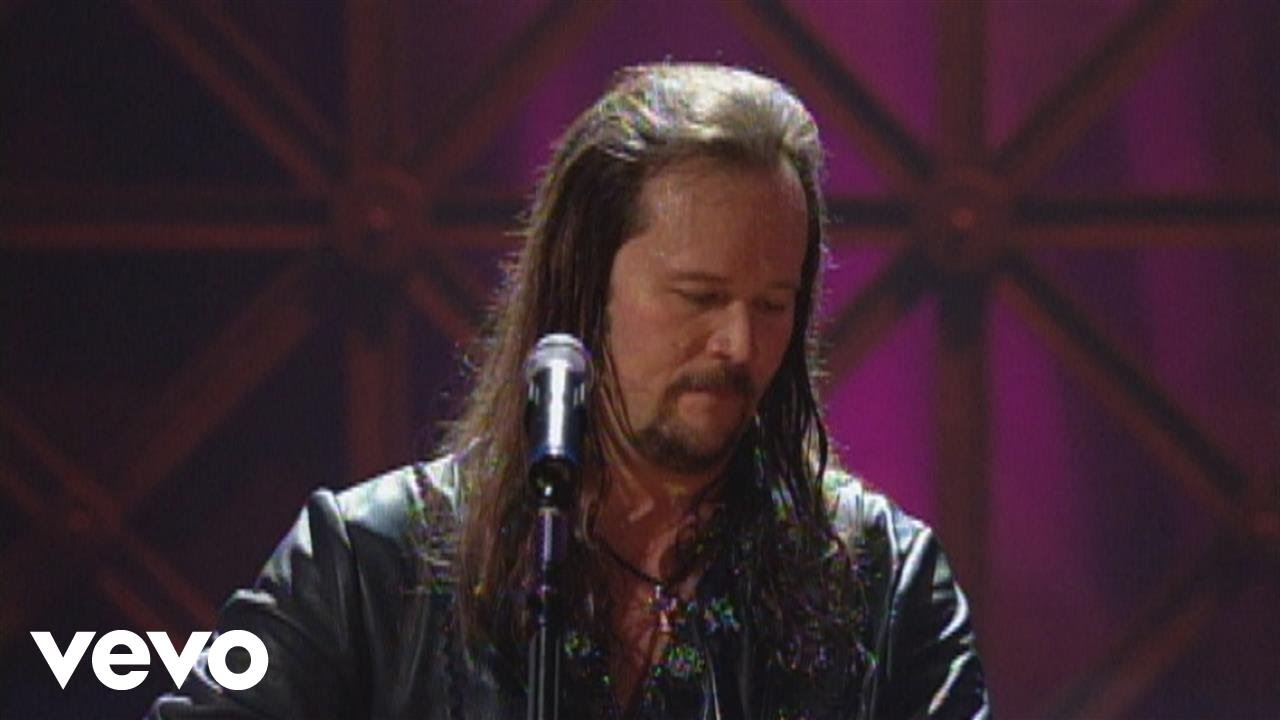
A highway romance with a steering-wheel heartbeat—danger flirting with destiny, told in a voice that’s lived a little.
Set the facts on the dash first. “Modern Day Bonnie and Clyde” is Travis Tritt’s outlaw tale-with-a-wink, released as the fourth single from Down the Road I Go on January 7, 2002. Written by Walt Aldridge and James LeBlanc, produced by Tritt with Billy Joe Walker Jr., and issued on Columbia Nashville, it became a late–career radio jolt: No. 8 on Billboard Hot Country Songs and No. 55 on the Hot 100 (album cut 4:44, single edit 3:59). The single even carried a fitting B-side—“It’s a Great Day to Be Alive.”
What’s the story? A truck-stop meeting in Johnson City, Tennessee blooms into a two-state caper; before the narrator knows it, he’s northbound on I-95, money on the motel bed in Richmond, and sirens closing in. It’s crime as plot device, sure, but the emotion underneath is familiar to anyone who’s ever been swept up by the wrong right person: the moment you realize you’ve crossed a line, and crossed it willingly. Tritt sings it not like a cartoon outlaw, but like a man who understands how quickly ordinary life can tilt. That’s a big part of why the record sticks.
On Down the Road I Go (released October 3, 2000), the track is the grit to the album’s shine, a reminder that the same singer who can cradle gratitude (“It’s a Great Day to Be Alive”) can also lean into a swampy shuffle without breaking stride. Critics caught the texture: Billboard praised its “hypnotic” pull and retro snap—code for the way the groove rolls forward like a two-lane at dusk. Tritt’s baritone rides dead center—unhurried, slightly grizzled—and the band gives him air: kick drum steady, guitars talking in low voices, organ flickering like dashboard light.
The music video underlines the tale with cinematic neatness. Directed by Michael Merriman, shot in California, and featuring Billy Bob Thornton as the hapless narrator, it stages the truck-stop meet-cute, the convenience-store grab, the motel-room high, and the inevitable blue-light curtain call. Tritt himself shows up as a tow-truck driver—one of those wry cameos that says, “I’ve told this story enough times to know how it ends.” The clip doesn’t glorify the spree; it frames the rush, then lets responsibility walk in through the door.
Under the hood, the writing is classic country engineering. Aldridge and LeBlanc keep the lyric plainspoken and scene-driven—no moralizing, just events unfolding in real time—so the chorus can do the heavy lifting. That choice plays to Tritt’s strengths. He’s always been a communicator first, a stylist second: the guy who can bring a room along with a raised eyebrow and a well-placed growl. Here, he turns that gift to narrative, letting small details—place names, highway numbers, a bag of cash—stand in for bigger truths about temptation, momentum, and the price of going along for the ride.
For older listeners, the song lands less as a heist fantasy than as a parable about agency. The narrator never quite presents himself as a victim; he knows he said yes. That subtlety—accepting your own role in the trouble you’re in—gives the track its adult weight. It also explains the lasting appeal on stage: the groove is friendly enough for a sing-along, but the story has edges. You can dance to it and still feel the caution in your bones.
And the context matters. By the early 2000s, Tritt had already notched a decade’s worth of smashes; this single showed he could still surprise—sonically and commercially—without chasing trends. Slotted alongside the album’s softer moments, “Modern Day Bonnie and Clyde” gave Down the Road I Go a darker glint and, in the process, handed fans a narrative they could carry into their own lives: that thrill and consequence often arrive in the same car.
Put it on tonight and notice how the rhythm feels like a road you know: steady, dangerous only if you forget you’re the one at the wheel. That’s the grown-up secret inside the outlaw gloss—and Tritt, with that seasoned baritone, makes sure you hear it.